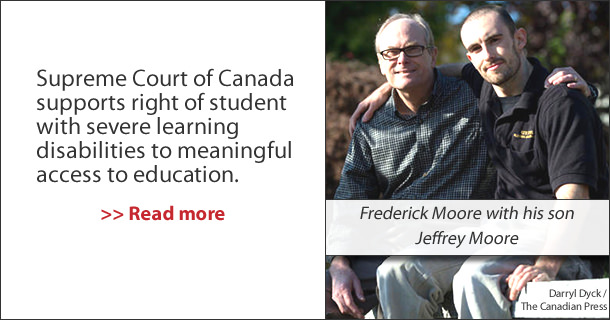Landmark Supreme Court decision on LD case
Supreme Court of Canada supports right of student with severe learning disabilities to meaningful access to education.
On November 9, 2012, in a unanimous decision, the Supreme Court of Canada ruled in favour of the appeal of the Moore family, who claimed that their local school district failed to provide the special education supports that Jeffrey Moore needed in order to get meaningful access to general education. Read the full Supreme Court decision here (PDF File)
LDAO extends congratulations to the Moore family, their attorneys, and the organizations that made arguments on their behalf as interveners at the Supreme Court hearing. LDAO sends its sincere thanks to Yude Henteleff, C.M., Q.C., who has been LDA of Canada’s intervener counsel since the original BC Human Rights Tribunal hearings. LDAC has appeared at every level of the Moore claim as an intervener, represented at each hearing by volunteer lead lawyer, Yude Henteleff, who is a prominent and nationally respected human rights expert and advocate.
History
Jeffrey Moore had been labeled as having a severe learning disability and in 1994 he became eligible to attend an intensive program for students with severe learning disabilities. That program was cut due to financial cost saving measures and the services that were subsequently offered were not comparable to the services he would have received in the intensive program. Jeffrey’s parents were advised to put him in a private school, which they did, at considerable financial sacrifice. With appropriate educational supports Jeffrey was able to go on to become a successful journeyman plumber.
Mr. Moore filed an application at the BC Human Rights Tribunal alleging a failure to provide him with an intensive program that was as appropriate to meet his unique needs as a student. The Tribunal determined that Jeffrey Moore had experienced discrimination when the School District and the Ministry of Education failed to accommodate his needs in the delivery of educational services. The Tribunal decision was later overturned by the BC Supreme Court, and the Court of Appeal for BC dismissed Mr. Moore`s subsequent appeal. A final appeal was made by Mr. Moore, on behalf of his son, to the Supreme Court of Canada.
By unanimous decision the Supreme Court of Canada decided that the BC Human Rights Tribunal’s original “finding of discrimination against Jeffrey Moore by the [School] District should be upheld, as should the individual orders, which reimburse the Moores for the cost of private schooling and award them damages.” (Section 70 of the decision)
The court disagreed with the argument that Jeffrey should be compared to other students with special needs in deciding if he was subject to discrimination, stating that “for students with learning disabilities like Jeffrey’s, special education is not the service, it is the means by which those students get meaningful access to the general education services available to all of British Columbia’s students” (Section 28)
Justice Rosalie Abella’s written decision contains the statement, “Adequate special education, therefore, is not a dispensable luxury. For those with severe learning disabilities, it is the ramp that provides access to the statutory commitment to education made to all children in British Columbia.” (Section 5)
LDAO supports the right of all students with learning disabilities to adequate special education programs and services, including intensive evidence-based interventions for those who need them.
Photo credit: Darryl Dyck / The Canadian Press


